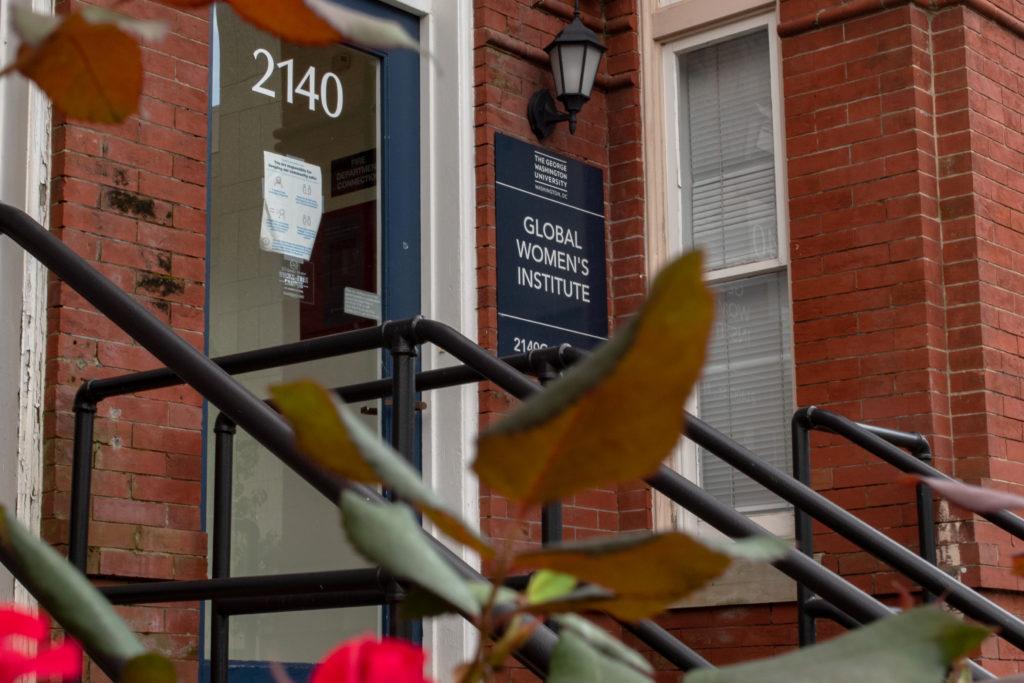The Global Women’s Institute is publicly launching a research program focused on gender-based violence this month, after securing funding last fall.
GWI officials and researchers said the program, titled “Building GBV Evidence in Conflict and Refugee Settings,” will offer the three components to allow humanitarian aid workers to research and compile data on gender-based violence in situations like armed conflicts and refugee camps worldwide. The program’s participants said generating and collecting more GBV research and data, like gender inequalities and power imbalances, will lead to a greater understanding of an understudied and underfunded field.
Maureen Murphy, a research scientist at the GWI, said the program’s three segments – a course, a research portal and a grant – aim to provide humanitarian aid workers with the necessary education, expertise and funding to study and collect data on real-world GBV experiences.
“The idea is really working hand in hand with humanitarian aid workers to identify what the most important research topics are and support them to be able to do ethical, safe and rigorous research around gender-based violence in humanitarian settings,” she said.
Murphy said the program connects field workers and researchers with GBV academics and experts through its free technical assistance portal and offers a free online course that serves as an educational track for people interested in studying GBV. She said officials selected two non-profit organizations on gender equality – Jago Nari Unnayan Sangstha and Right to Play International – as grantees last year to research and generate ethical and safe data and tools on GBV, like gender equity and equal access, in Bangladesh, Lebanon and Uganda.
GBV is an “overarching” term that encompasses all types of violence caused by inequitable power dynamics, Murphy said. She said GBV most often applies to violence that women and girls face from men and boys but can also include groups like the LGBTQ+ community.
She said the program received a three-year grant from the U.S. Department of State Bureau of Populations, Migration and Refugees last fall, and GWI has spent the past year developing the GBV course, compiling a list of experts in the GBV field for the portal and identifying and selecting the two grantees to create the program.
She said the program is officially launching the course and technical assistance portal this month, and the grantees are now beginning to start their research
“Now the course is launched, now we’re ready to accept requests for technical assistance and now our grantees are going to be starting their research projects,” she said. “So now that’s kind of where we are in the process under this funding cycle.”
Murphy said the program will eventually work directly with humanitarian agencies and incorporate graduate students in the Milken Institute School of Public Health and the Elliott School of International Affairs in opportunities like research and collaborations for their capstone project. She said students can assist agencies with background research and GBV tool development to gain real-world experience through the program.
“One of the really great things about situating a program like this at GW is that we have a great student base,” she said.
Mary Ellsberg, the founder and executive director of GWI said the idea for the program came from previous GBV research at the GWI in South Sudan, Lebanon and Northern Uganda refugee settings. She said participants there found a “real scarcity” of knowledge that exists about GBV in conflict settings and its implication for additional conflict.
“The idea is to help local researchers and local practitioners understand the basic tools of research, and especially we want to demystify the research process,” she said.
Jessie Weber, a graduate student studying public health who has worked at the GWI since last year, said she helped write the GWI manual on research gaps within the GBV field, which the program’s course will follow. She said she is working with her supervisors to translate the manual into other languages, like French, Spanish and Arabic, to make it more accessible to individuals interested in the field.
“If people are looking to conduct any kind of GBV evidence data collection, the course can be really helpful to people who don’t have a background in working in GBV,” she said. “It walks you through some considerations that you need to have, like ethical considerations, general logistical considerations and different techniques that you can use for different forms of support.”
She said the program will increase knowledge and produce evidence on GBV through its “multi-pronged” approach, which will lead to more effective GBV intervention and treatment tools to address gender inequalities and violence against certain groups. She said anyone who wants to work in the humanitarian field needs to know about GBV because it can affect any group of people and existing knowledge about it remains lacking.
“Gender-based violence is unfortunately prevalent throughout the world, throughout all kinds of populations,” she said. “You don’t really need to have any discernible external vulnerabilities that people can pick up on in order for you to potentially be susceptible to it.”








